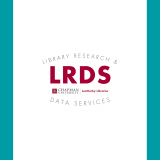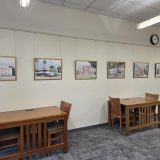My Librarian’s Favorite Resource(s): Communication and Honors
April 29, 2021
This week we get to learn about some resources that are particular to one field of studies and also helpful to all Chapman University students interested in learning about different research methods, as we speak to our Coordinator of Scholarly Communications & Electronic Resources, Kristin Laughtin-Dunker, who is the subject liaison librarian for Communication and Honors.
Kristin writes, “I’m the liaison librarian for the School of Communication and the Honors Program, both of which have students researching a wide variety of interesting topics, often with fascinating interdisciplinary approaches that draw resources from a broad range of fields.
For Communication research, I always encourage students to start with Communication & Mass Media Complete, which is one of the top resources in the field with the full text of over 375 journals, some going back to 1900. It covers many topics relating to communication and media studies, but also linguistics, rhetoric, discourse, and research into communication within various professions or fields, so it is useful to students studying Strategic and Corporate Communication or Health Communication as well. Its interface is similar to the library’s “Start Your Search” interface that students receive instruction about in their first year at Chapman University.
![]() SAGE Research Methods Online is a database I like to advertise to students in all programs, because it is so useful for learning about different research methods. It focuses on methodologies and isn’t specific to any one discipline, so it’s really helpful whether you are trying to understand the research method(s) behind an article you’ve located in a database or whether you are trying to plan your own research project. One thing I particularly like about this database is that it offers so many formats for learning about different research methods – there are books of varying lengths, videos, reference materials, podcasts, and even case studies and datasets, so it is very accommodating to different learning styles. There is also a project planning tool to help you design and map out your own research projects!
SAGE Research Methods Online is a database I like to advertise to students in all programs, because it is so useful for learning about different research methods. It focuses on methodologies and isn’t specific to any one discipline, so it’s really helpful whether you are trying to understand the research method(s) behind an article you’ve located in a database or whether you are trying to plan your own research project. One thing I particularly like about this database is that it offers so many formats for learning about different research methods – there are books of varying lengths, videos, reference materials, podcasts, and even case studies and datasets, so it is very accommodating to different learning styles. There is also a project planning tool to help you design and map out your own research projects!
We also have many interesting handbooks and encyclopedias on communication topics through our Routledge Handbooks Online, SAGE Knowledge, and Gale eBooks collections. I also recommend checking out the “Find Books and Reference Materials” page on each of the three Communication-related research guides:
Under “Electronic Books and Reference Materials,” there is a tab that says “Handbooks and Encyclopedias” that contains direct links to relevant titles in each of those areas.”


